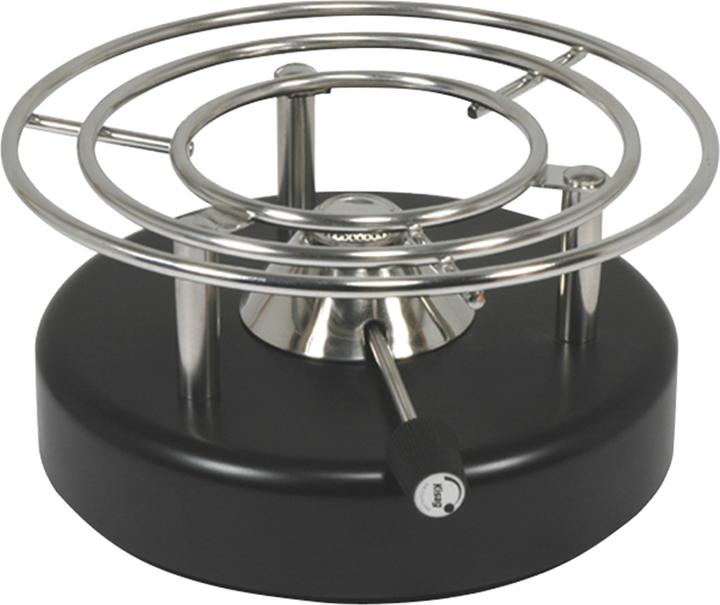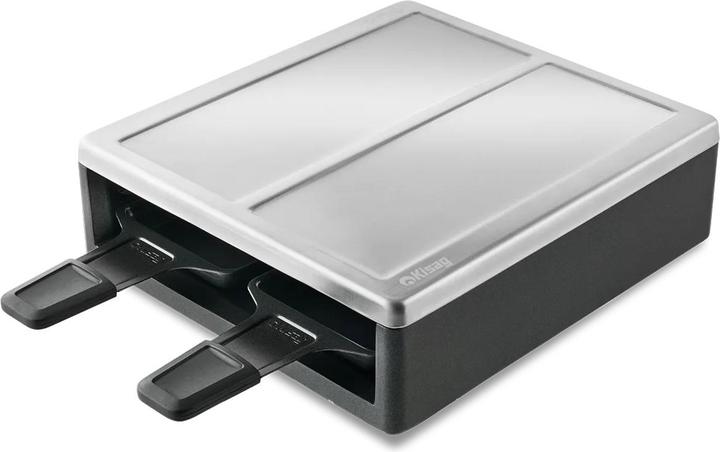
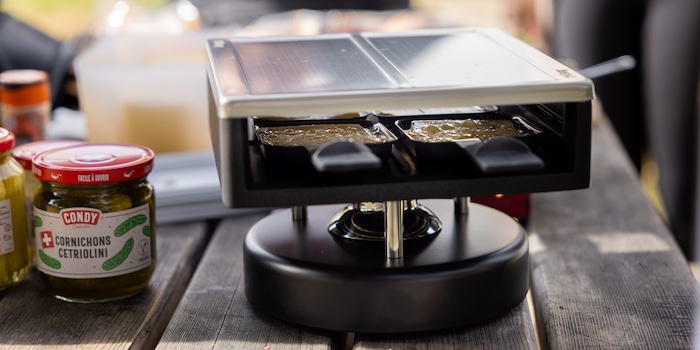
Wireless cheese? The Kisag Sierre raclette grill put to the team test
The Sierre raclette attachment from Kisag fits onto gas burners. I’m facing it off against the appetite of the entire editorial team. Four little pans versus nine hungry mouths – a challenge!
It’s 11:25 a.m. Houston, we have a problem! And by «we», I mean myself and the Kisag Sierre raclette attachment, which I plan to test with my team on this sunny but windy October day. This is the time when Simon Balissat usually hollers, «Are you guys coming???» as he stomps through the office – as if being steered into one of the nearby food joints by a higher power (and the fear of not being first in line). We usually march on after him, à la Double Duck. But not today. Today, we feast on cheese. It’s still lying in the fridge, the test device is still in its box, and the bread is still at Migros.
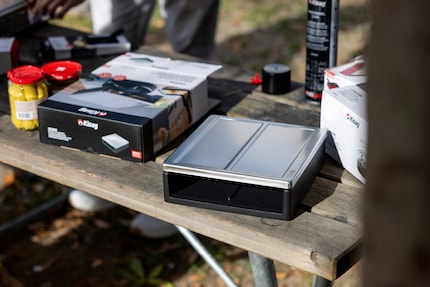
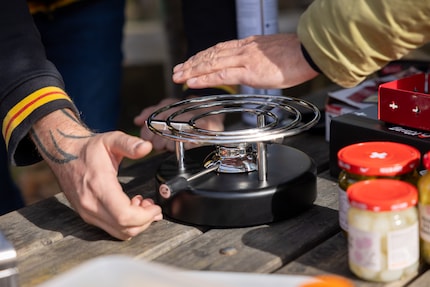
When we finally set up at a picnic table next to the Galaxus office, it’s clear: this is more than just a raclette oven review. It’s an exercise in team building. Setting up, cutting the bread, preparing the pans – teamwork makes the dream work. With so many different opinions, the test turns into an overall impression.
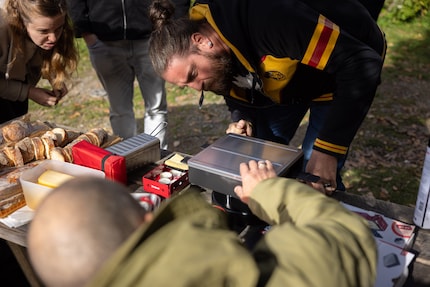
A modular system
The test unit can’t work on its own: it requires a suitable gas burner with a diameter of up to 21 centimetres. The Sierre doesn’t work with paste burners, and it doesn’t come with raclette pans either. The idea is to have only what you actually need for fondue/raclette season. We were given the following elements for testing:
We use an eclectic mix of raclette pans: one is from Kisag, the others I brought from home. In addition, we’re running two candle-powered raclette sets, just to make sure no one starves. After all, the Sierre attachment is designed for four people – so four against nine would be unfair.
Partaking in the cheesy feast are Darina Schweizer, Lorenz Keller, Patrick Vogt, Luca Fontana, Ramon Schneider and photographer Chris Walker. Also joining us is our sponsor of silver onions and gherkins, Martin Jungfer, Head of Content & Cornichons. Finally, our Chef de Casein is Simon Balissat, who brought top-notch cheesy goodness. Safe to say the taste test won’t fail for lack of cheese.
Setting and heating up
The Sierre attachment consists of two parts. There’s the aluminium die-cast housing, which is sandblasted and has a double-layer non-stick coating. The scratch-sensitive lid is made of matt polished stainless steel. We use its surface to warm bread slices and for glossy, grease-shine photos.
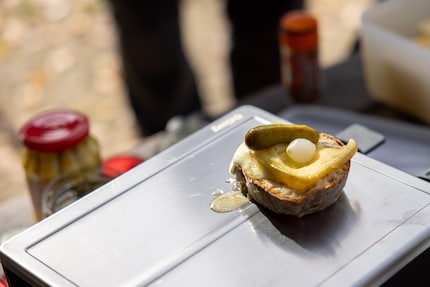
The Sierre isn’t suitable as a table grill, which makes sense, as it only heats from below. Both parts of the Sierre are dishwasher-safe. The housing isn’t perfectly square – it’s 25 cm long and 23 cm wide – and just wide enough to fit four raclette pans.
Two small ridges on the underside limit the contact area to 21 cm. The attachment isn’t fixed in place. On our 20 cm burner, it has some play. If someone bumped it too hard, it could tip over.
The Longfire gas burner produces up to 1,400 watts. On paper, that matches the power of electric raclette ovens. On medium heat, one tank should last about two hours. Of course, we turn it up all the way and easily get through an extended lunch break.
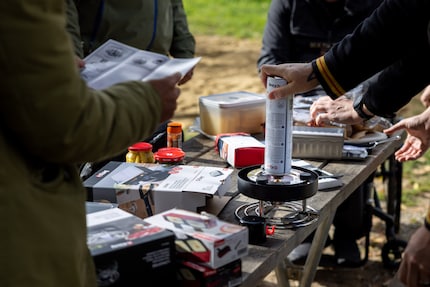
The outdoor experience
We attempt a cold start in the autumn wind. Flame on, pans in. It takes just under eight minutes for the first cheese to become thoroughly bubbly. The other three slices are only just starting to sweat; the wind slightly affects the gas flame, so the housing doesn’t heat evenly at first.
The marks on the underside later show me that the heat zone was about four centimetres off-centre. We rotate the attachment 180 degrees and wait. We’re one hangry group.
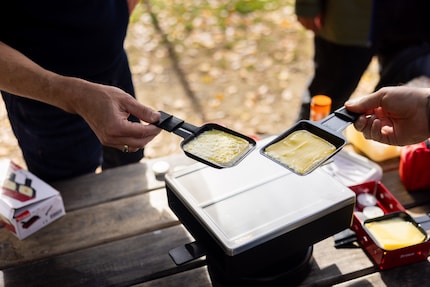
It feels a bit like kindergarten. Patrick finds the gas burner, hisses wildly at full power, too loud. Ramon is once again playing with the bread knife. Luca and Darina are keeping busy with the tealights. And Lorenz has got his fingers in everything hot and greasy. Simon’s stood nearby, hands in his pockets, probably dreaming of a post-work gourmet snack.
As the device warms up, so does our mood. Soon even Balissat’s two-centimetre-thick cheese chunks are melting evenly, and we can eat at a pleasant pace. No one will be returning to their desk hungry.
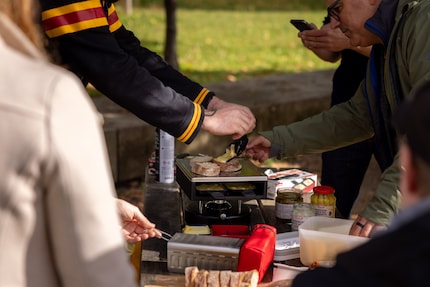
The indoor experience
Without external influences, everything goes a bit faster. At full heat, it takes just under three minutes after firing up for a standard cheese slice to melt. The heat can be adjusted precisely and quickly, so you can meet everyone’s needs – from «starving» to «almost full».
Not too shabby
Washing up is no problem even without a dishwasher. The surfaces clean easily, and grease doesn’t get into any hard-to-reach grooves.
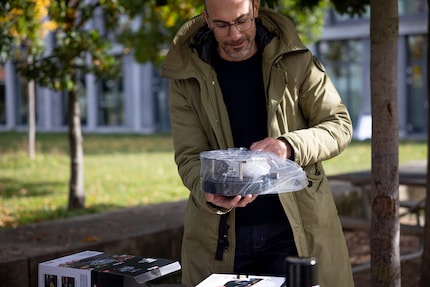
Speaking of hard-to-reach grooves: to gauge what was going on in my colleagues’ minds, I conducted a post-meal survey. After an average of 18:44 minutes of reflection, the official result is in: 3.875 stars for the Sierre raclette attachment.
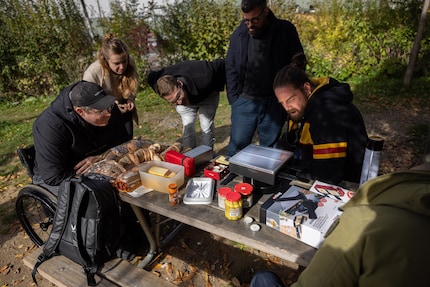
In a nutshell
Modular, space-saving, high-quality
The Sierre attachment is dishwasher-safe and doesn’t take up much space in the cupboard. Anyone with a suitable gas burner can turn it into a raclette grill that performs well even in windy conditions. One note for improvement is that the risk of accidents could be reduced if the attachment could lock onto the gas burner.
Since Kisag promotes its design as safer than corded devices, the stability issue is somewhat of a contradiction. The closer the gas burner’s diameter is to the maximum 21 cm, the lower the tipping risk.
The modular system’s advantage is that you don’t end up buying accessories you might not need. Pans aren’t included and the Sierre consists of just two parts. They do come at a price, but are as high-quality as you’d expect from Kisag.
Pro
- Modular system
- Space-saving
- Dishwasher-safe
- Suitable for outdoor use
- Good heat distribution once the attachment is hot
Contra
- Surface prone to scratches
- Can slide around and potentially tip over
Simple writer and dad of two who likes to be on the move, wading through everyday family life. Juggling several balls, I'll occasionally drop one. It could be a ball, or a remark. Or both.
